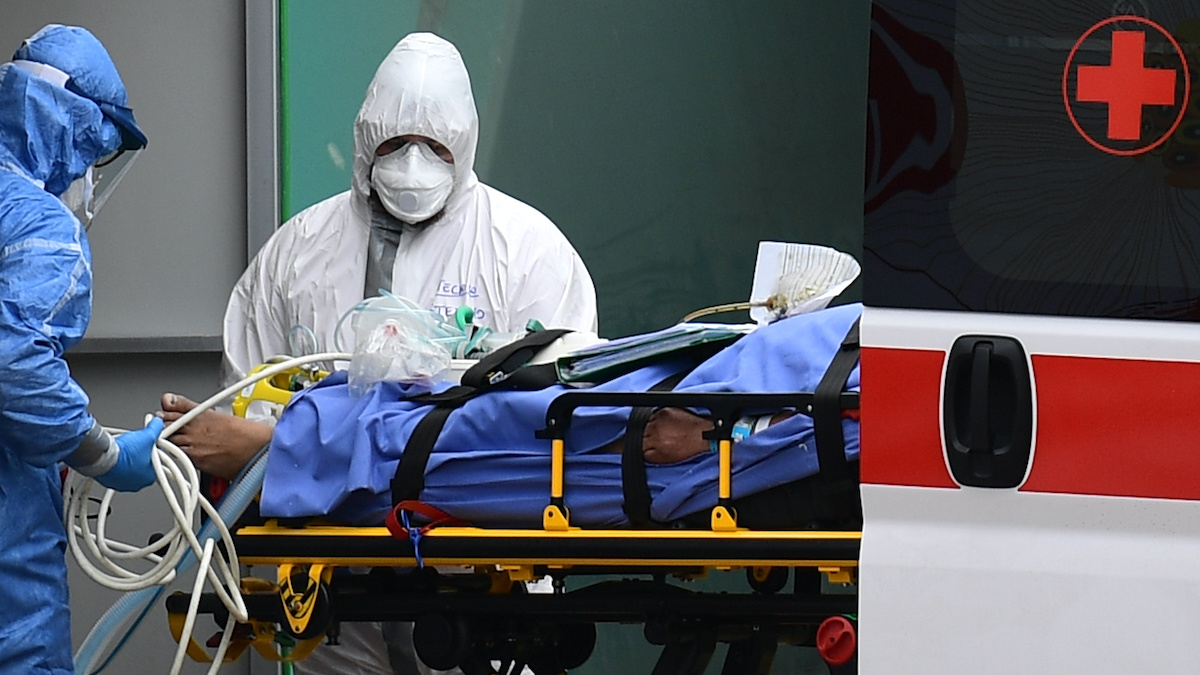
More Than Half of COVID-19 Survivors in Study Reported Psychiatric Disorders

Healthcare workers admit a coronavirus patient to a special intensive care unit set up outside Milan's San Raffaele hospital, where 55 percent of patients surveyed developed mental health symptoms after recovering from the new coronavirus. MIGUEL MEDINA / AFP via Getty Images
A study from a hospital in Milan, Italy has uncovered another complication to the process of recovering from the new coronavirus. More than half of patients surveyed one month after their treatment had developed a psychiatric disorder.
The study, published in Brain, Behavior, and Immunity on Thursday, found that 55 percent of former patients surveyed experienced either post-traumatic stress disorder (PTSD), anxiety, depression, insomnia or obsessive compulsive (OC) symptoms.
“After three weeks of treatments, I was healing from COVID, at home, had no fever, and just a little cough,” one of the patients surveyed for the study said. “But sometimes at night, my breath could go away all of a sudden, making me feel as if I was to die. I knew what it was because I had suffered from panic attacks in the past. I stayed there out on the balcony, for hours, trying to put fresh air into my lungs. It was terrible. Panic made me suffer more than COVID.”
To obtain their results, researchers surveyed 402 patients who were treated at Milan’s San Raffaele Hospital between April 6 and June 9: 265 men and 137 women. The patients were all initially assessed at the emergency room and then either admitted to the hospital or treated at home.
A month after treatment, the patients were interviewed and given questionnaires to assess their mental health. They reported psychiatric symptoms at the following rates:
- Anxiety: 42 percent
- Depression, 31 percent
- Insomnia: 40 percent
- PTSD: 28 percent
- OC Symptoms: 20 percent
Women fared worse psychologically than men, The Guardian reported. People who had previously been diagnosed with a psychiatric disorder also were more likely to develop mental health symptoms after recovering from COVID-19.
The researchers were not surprised by their results, because previous studies of other coronaviruses had turned up increased mental health problems in survivors. For example, 10 to 35 percent of those who recovered from SARS have experienced psychiatric symptoms.
The reason COVID-19 survivors develop these symptoms could be down to two main reasons, the researchers think: the immune system’s response to the disease and the stress of illness, such as fear, stigma and social isolation.
Research suggests a link between immune-triggered inflammation and mental illness. In addition, the study found that outpatients had worse mental health outcomes than people treated in the hospital, suggesting isolation played a role.
“Also considering the worse severity of COVID-19 in hospitalized patients, this observation suggests that less healthcare support could have increased the social isolation and loneliness typical of COVID-19 pandemics, thus inducing more psychopathology after remission,” the researchers wrote.
They said their findings warranted more investigation into the link between the pandemic and mental health issues.
“PTSD, major depression, and anxiety, are all high-burden non-communicable conditions associated with years of life lived with disability,” they wrote. “Considering the alarming impact of COVID-19 infection on mental health, the current insights on inflammation in psychiatry, and the present observation of worse inflammation leading to worse depression, we recommend to assess psychopathology of COVID-19 survivors and to deepen research on inflammatory biomarkers, in order to diagnose and treat emergent psychiatric conditions.”
The impact of the pandemic on mental health isn’t limited to disease survivors, however, as Tech Times pointed out.
Public health experts have already warned about a second pandemic of psychological disorders even among those who do not contract the disease. The fear of illness and the stress of losing employment or simply following current events could all take a toll.
- Anxiety Medication Prescriptions up 34% Since Coronavirus ...
- 75,000 American Deaths Predicted From Overdose and Suicide ...
- Should 'Eco-Anxiety' Be Classified as a Mental Illness? - EcoWatch
- Are You Having Trouble Sleeping Lately? ‘Coronasomnia’ Might Be the Reason - EcoWatch
- Trouble Sleeping Lately? ‘Coronasomnia’ Might Be the Reason - EcoWatch

 233k
233k  41k
41k  Subscribe
Subscribe 